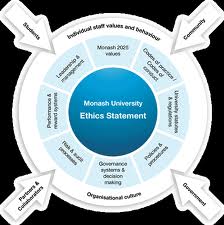Requisite Abilities,The ability to identify ethical issues
1. The ability to
identify ethical issues coupled with the ability to sensitize others to ethical
issues.
2. The ability to
acquire relevant information (e.g., clinical information, psychosocial
information) when gaps are revealed, coupled with the ability to know which
questions to ask when attempting to fill in the gaps.
3. The ability to
bring systematic thinking to ethical problem-solving.
a. The ability to
analyze the meanings of concepts and principles. Such analysis should include a
consideration of the meaning of words in casual everyday contexts, their
technical meaning, and their idiosyncratic use.
b. The ability to identify
underlying assumptions and to question those that are believed to be flawed or
misleading.
c. The ability to
reframe a presenting ethical problem when appropriate (i.e., not in an attempt
to evade or to distract), and thereby to shift the ethical discussion so as to
allow for a consideration of alternative options that might otherwise not be
considered.
4. The ability to
make and defend sound ethical judgments that reflect an understanding of the
values of others, including:
a. The ability to
identify possible alternative courses of action. to outline the associated
values and possible consequences. and to provide the best arguments for and
against the various options; and
b. The ability to
provide a recommendation "for consideration." without attempting to
manipulate the decision making process.
5. The ability to
communicate effectively with (which includes actively listen to) health care
workers, patients, patients' families, administrators, and social agencies.!'
a. The ability to
elicit, appreciate, explore, and (when necessary) help clarify the evolving/
changing viewpoints, beliefs, and values of others.
b. The ability to
represent the evolving/changing viewpoints, beliefs, and values of one party to
another.
c. The ability to
observe and perceive interests and relationships that influence discussion and
behavior.
6. The ability to
facilitate (e.g., mediate, negotiate, and arbitrate), coupled with an ability
to ascertain when one or more of these activities is appropriate.
7.
The
ability to recognize and work within the limits of one's knowledge balanced
with the ability to accept challenges.
8. The ability to
recognize one's own partiality and not to introduce personal beliefs (i.e.,
values or traditions one finds persuasive) in an inappropriate manner.
Specifically, personal beliefs and value commitments should be identified in a
timely fashion when there is an overriding commitment to a specific value
system that is informing the discussion (e.g., religious or political beliefs).
Personal beliefs and value commitments should not be introduced: (a) in a
clandestine or subliminal way, or (b) under false colors-as facts when they are
not, as consensually agreed on when they are not, or as legal requirements when
they are not.
9. The ability to
participate in group decision making, even when this may generate a conclusion
with which one disagrees, and a willingness to tolerate such group decisions.
This ability must be coupled with a strong sense of personal and professional
integrity so that one may distinguish outcomes that one will not, on moral
grounds, endorse/sanction (e.g., an outcome that violates an important moral
principle, but is chosen to avoid confrontation) from outcomes that one
disagrees with, but will endorse/sanction (e.g., an outcome within communal and
institutional norms).
10. The ability to
withstand the influence of public opinion and to question existing traditions,
customs, and laws.
To be sure, different clinical
settings and different clinical situations necessarily require the exercise of
different abilities. The Profile attempts to provide a reasonably complete
listing of the minimum skills one should be able to draw on, as necessary. It
is not expected, nor for that matter would it be productive, for an ethics
consultant to exercise all of these abilities at anyone time. Consider, for
example, the ability to facilitate (e.g., mediate, negotiate, and arbitrate)
(A6). Clearly, different facilitation roles















